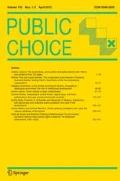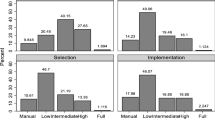Abstract
To change the law, an interest group must choose between lobbyingthe legislature and litigating for new precedent. Lobbyingbecomes more likely as the relative benefits from rule changebecome greater, as the costs of lobbying become smaller and asthe voting strength of the interest groups becomes larger.Litigating becomes more likely as trial costs fall, as therelative benefits from rule change become greater, as theinclination of courts to change existing precedents increases,and as the interest group is involved in more trials. Examplesof using a litigating strategy include the NAACP is its battlefor racial integration and attorneys seeking change in tort law.Business, in resisting changes to tort law, has used the judicialprocess. The nature of equilibrium, if any, is not clear.
Similar content being viewed by others
References
Bailey, M.J. and Rubin, P.H. (1994). A positive theory of legal change. International Review of Law and Economics 14: 467–477.
Becker, G.S. (1983). A theory of competition among pressure groups for political influence. Quarterly Journal of Economics 98: 371–400.
Berkowitz, E.D. and Berkowitz, M. (1985). Challenges to workers' compensation: An historical analysis. In J.D. Worrall and D. Appel (Eds.), Workers' compensation benefits: Adequacy, equity, and efficiency. Ithaca, NY: ILR Press.
Commerce Clearing House (1981). Products liability reporter. New York: Commerce Clearing House.
Curran, C. (1992). The spread of the comparative negligence rule in the United States. International Review of Law and Economics 12: 317–332.
Farber, D.A. and Frickey, P.P. (1991). Law and public choice. Chicago: University of Chicago Press.
Farmer, A. and Pecorino, P. (1999). Legal expenditure as a rent-seeking game. Public Choice 100: 271–288.
Gedde, D. (1992). The determinants of products liability law: An interest group perspective. Unpublished paper.
Hillman, A.L. and Riley, J.G. (1989). Politically contestable rents and transfers. Public Choice 1: 17–39.
Hirshleifer, J. (1991). The paradox of power. Economics and Politics 3: 177–200.
Huber, P.W. and Litan, R.E. (Eds.). (1991). The liability maze. Washington: Brookings.
Landes, W.M. and Posner, R.A. (1987). The economic structure of tort law. Cambridge, MA: Harvard University Press.
Leubsdorf, J. (1984). Toward a history of the American rule on attorney fee recovery. Law and Contemporary Problems 47: 9–36.
Olson, M. (1982). The rise and decline of nations. New Haven: Yale University Press.
Posner, R.A. (1998). Economic analysis of law. Fifth Ed. New York: Aspen Law & Business.
Prichard, R.S. (1988). A systemic approach to comparative law: The effect of cost, fee, and financing rules in the development of the substantive law. Journal of Legal Studies 17: 451–475.
Priest, G.L. (1977). The common law process and the selection of efficient rules. Journal of Legal Studies 6: 65–82.
Riker, W.H. and Weingast, B.R. (1988). Constitutional regulation of legislative choice: The political consequences of judicial deference to legislatures. Virginia Law Review 74: 373–401.
Rubin, P.H. (1977). Why is the common law efficient? Journal of Legal Studies 6: 51–63.
Rubin, P.H. (1995). Fundamental reform of tort law. Regulation 4: 26–33.
Rubin, P.H. and Bailey, M.J. (1994). The role of lawyers in changing the law. Journal of Legal Studies 23: 807–831.
Rubin, P.H., Calfee, J.E. and Grady, M.F. (1997). BMW v. Gore: Mitigating the punitive economics of punitive damages. Supreme Court Economic Review 5: 179–216.
Tollison, R.D. (1988). Public choice and legislation. Virginia Law Review 74: 339–372.
Tullock, G. (1980). Efficient rent-seeking. In J.M. Buchanan, R. Tollison and G. Tullock (Eds.) Toward a theory of the rent-seeking society, 269–282. College Station: Texas A&M Press
Tushnet, M.V. (1987). The NAACP's legal strategy against segregated education. Chapel Hill: University of North Carolina Press.
Author information
Authors and Affiliations
Rights and permissions
About this article
Cite this article
Rubin, P.H., Curran, C. & Curran, J.F. Litigation Versus Legislation: Forum Shopping by Rent Seekers. Public Choice 107, 295–310 (2001). https://doi.org/10.1023/A:1010337522287
Issue Date:
DOI: https://doi.org/10.1023/A:1010337522287




